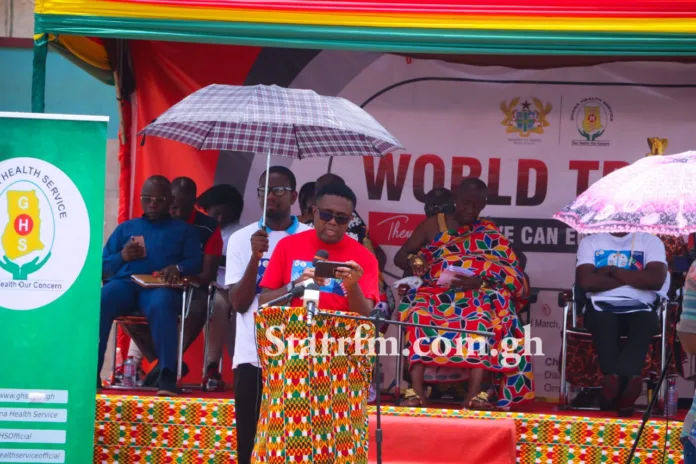
Ghana may grapple with a critical shortage of tuberculosis (TB) medicines and laboratory supplies, casting a shadow over the nation’s efforts to combat the disease.
The shortfall, amounting to a significant 40% deficit in funding for the national strategic plan for tuberculosis, poses a serious challenge to TB control initiatives in 2025 and 2026.
Civil Society Organizations have sounded the alarm over the underfunding of Ghana’s TB program, warning that the situation could impede progress in addressing the staggering number of missing TB cases, which stood at 44,000 annually.
Despite recording a remarkable achievement in detecting TB cases with a surge to 19,000 cases in 2023—a 50% increase from 2020—and achieving a treatment rate of 87%, Ghana’s fight against TB may be hindered by the funding gap if nothing is done urgently.
Dr. Yaw Adusi-Poku, Programme Manager for the National TB Control Programme, emphasized the importance of swift action to address the funding challenge.
He stressed the urgent need for government intervention to address the lack of budget allocation for procuring TB medicines and laboratory supplies for the upcoming years, particularly under the new global funding program.
“Our main challenge has been to finance TB activities. As we speak the National strategic plan that we use is underfunded by 40%. So under the new global fund, the program has no fund for procurement of TB medicines and Laboratory supplies for 2025 and 2026. We don’t have TB medicines. This is an urgent situation we have to work on. Accordingly, the program needs government support to fill the gap” Dr. Yaw Adusi -Poku lamented.
Eric Kwabena Agbozo, Board Chair of Stop TB Partnership Ghana, expressed concern over the persistence of missing cases amid the funding shortfall.
He said the Civil Society Endowment Fund has been initiated to rally support and supplement government efforts in tackling the imminent shortage of TB medicines and supplies.
“Currently in Ghana, we have under 200 genxpert machines. And we have lesser digital x-ras which are very expensive as well as genexpert which is about 20,000 USD. The cartridge too costs $10 that is used to do the testing. The government is highly overburdened not to talk about economic-wise and the IMF bail-out. So if we want to put all our efforts into government the cases that are around we will not be able to find them so as a civil society we thought that we could do something to meet the government halfway so we have launched a civil society endowment fund to be coordinated by the private sector, academia, public sector, and our entities” Eric Kwabena Agbozo indicated.
He added that “according to the WHO report, Ghana has a backlog of annually 44,000 missing cases and Ghana has along the line has been making 13,000 until 2023 when we made the 19,000, so if you subtract 19,000 from 44000 the issue is clear we are not making even 50% and so we need to do everything possible to make sure we increase the case detection”.
These were revealed during the National launch of World TB Day in Koforidua on March 22, 2024 by Ghana Health Service, the Ministry of Health, and partners.
Dr. Franklin Asiedu Bekoe, Director of Public Health, speaking on behalf of the Director-General of Ghana Health Service, Dr. Patrick Kuma Aboagye, acknowledged the strides made in TB detection and treatment.
He said more than 2,500 healthcare personnel across both public and private sectors have received training, equipping all 261 districts with the capability to diagnose and treat TB in children.
Dr.Patrick Kuma Aboagye noted that, the completion of the Multi-Drug Resistant Tuberculosis (MDR-TB) Center of Excellence in Nsawam will offer medical care to seriously ill patients requiring admission. Additionally, it will serve as a training hub for clinicians in the treatment and management of the disease.
The Director of External Coordination at the Ministry of Health Dr.Hafiz Adams, said commitment to meeting the global target of ending TB by 2030 is yielding positive results evident in increased enrollment of individuals on TB treatment programs and implementation of TB prevention strategies.
He however added, “we need to intensify efforts to identify missing TB cases with a special focus of detecting TB in children”.
He reaffirmed that the government’s agenda 111 projects and retooling of hospitals with modern and cutting-edge technologies will bolster the fight against TB.
The World Health Organization (WHO) reports that 10.6 million people fell ill with TB in 2022, with 1.3 million succumbing to the disease. However, global efforts have saved 75 million lives since 2000, underscoring the significance of continued investment and commitment to ending TB.
As Ghana commemorates World TB Day 2024 under the theme ‘Yes! We can end TB!’, the focus is on translating high-level commitments into actionable steps.
The Ghana Health Services therefore held a float through the Principal streets of Koforidua to create awareness among the public.
Source:Ghana/Starrfm.com.gh/Kojo Ansah




